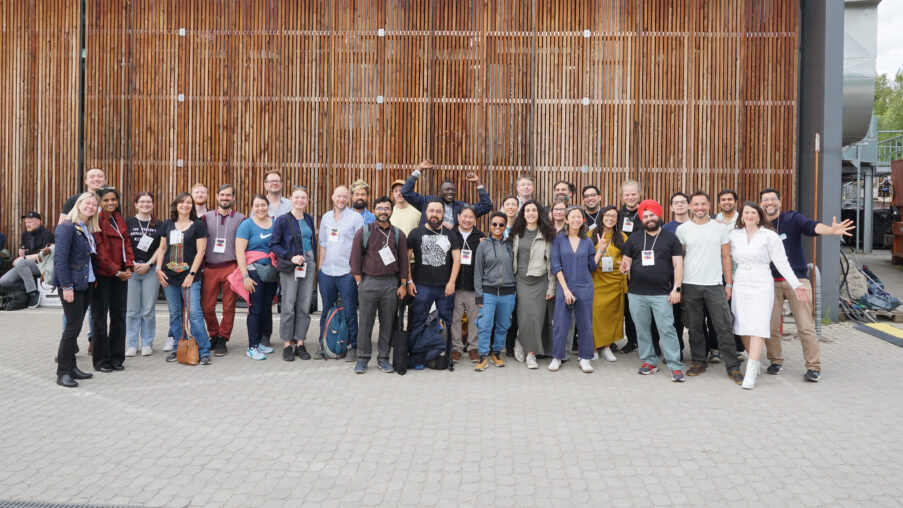This year’s Makerspace at re:publica was a vibrant explosion of creativity, collaboration, and community, and one thing became immediately apparent: when communities come together, they can move mountains.
The Makerspace continues to be the most global spot at re:publica — with more than 20 hands-on workshops led by an inspiring mix of Makers from over 21 countries. From Goa to Bogotá, Istanbul to Singapore, and New York to South Sudan, this diversity wasn’t just visible on a map — it was felt in the unique perspectives, tools, and stories each participant brought to the space.
Our second big learning? Kids come in all ages!
The Kids Maker Corner was a new addition to the Makerspace this year, and we were happy to watch it be a hub of continuous activity, not just for the little ones but also for curious adults. Throughout the three days, it was buzzing with energy, filled with hands-on making, spontaneous experimentation, and joyful connections.

One especially touching moment came during a shrink plastic workshop, when our friend — and one of the partners behind the Kids Maker Corner — Gabe shared a saying from the Philippines that perfectly captured the spirit of the Makerspace:
“Kiwi We Ke Nemen” — We make what we can with what we have.
Living the Future: “2050 Berlin Climate Collapse Kitchen”
In this powerful workshop, we weren’t just imagining — we were living a hypothetical crisis: Berlin in the year 2050, facing a full-blown food emergency. Instead of discussing the climate crisis in the abstract, participants were immersed in a fictional scenario: they had to act!
In just one hour, this brilliant group documented practical, step-by-step strategies for organising communities in times of crisis—from setting up common food distribution centres to transforming Berlin’s iconic Spätis into fermentation labs!
Watch the video to see how radical imagination meets grassroots resilience — and how much can emerge from a single hour of collaboration: 2050 Berlin Climate Collapse Kitchen — Check the Full Documentation
This session was more than a workshop — it was a blueprint for grassroots resilience, driven by imagination, empathy, and community know-how.

Rethinking Economics: Lessons from the Forest
In the thought-provoking session “Forest Economics,” Jay Cousins and Jeff Emmett asked us to rethink business models through the lens of mycelium networks, nature’s ultimate survivors.
What if businesses were designed to regenerate, die, or hibernate when their purpose was fulfilled? What if value wasn’t extracted but shared? What if our economy followed the logic of mushrooms?
Participants explored new economic archetypes — like the Beaver, Cicada, and Goose — and were invited to imagine a world where “business as usual” isn’t business at all.
It was a powerful reminder that sustainability isn’t just about better products — it’s about better systems, inspired by the living world.
Showcasing the Makerspace to Germany’s Education Minister
A highlight of this year’s event was welcoming Karen Prien, Germany’s Federal Minister of Education, Family Affairs, Senior Citizens, Women and Youth, to the Makerspace. Her visit recognised the growing importance of community-led spaces in future education models.
We introduced her to the OpenFlexure Microscope — a 3D-printed, open-source scientific instrument that’s as powerful as it is accessible. Designed to be built by anyone, anywhere, it opens the door to hands-on science education, empowering students and educators to explore the microscopic world and even create their tools. It’s proof that innovation doesn’t need to be expensive — just open.
What’s Next?
We’re still glowing from the energy of these three unforgettable days — but we’re also looking ahead. The Makerspace was built by many hands, and we want to keep building.
We’d love to hear from you if you have ideas, feedback, or would like to co-create the next edition. We’re also actively seeking partners to help us sustain and grow this community-powered space, focusing on building global community resilience — the emerging theme for next year.
Stay curious. Keep making. And thank you for being part of re:publica 2025!



